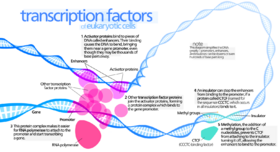Biology:SPT20

Transcription factor SPT20 is a regulator of transcription. It can recruit TATA binding protein (TBP) and possible other base factors to bind to TATA box. The model of its action by example Saccharomyces cerevisiae was studied.[1] It functions as a component of the transcriptional regulatory complex histone-acetylation a (HAT) SAGA, SALSA and FIG. SAGA is involved in the regulation of transcription-dependent RNA polymerase II about 10% of the yeast gene. In promoter, SAGA is required to engage basal transcription mechanisms. Affects RNA polymerase II transcription activity through various activities, such as TBP interaction (SPT3, SPT8 and SPT20) and promoter selectivity, interaction with transcription activators (GCN5, ADA2, ADA3 and TRA1) and modification chromatin by histone acetylation (GCN5) and ubiquitin deacetylation (UBP8). SAGA acetylates nucleosome or histone H3 to some extent (to form H3K9ac, H3K14ac, H3K18ac, and H3K23ac).
SAGA interacts with DNA via upstream activation sequences (UAS). SALSA, an altered form of SAGA, may be involved in positive regulation transcription. It is suggested that SLIK has partially overlapping functions with SAGA. Preferably acetylation methylated histone H3, at least after activation at the GAL1-10 locus. "ADA5 / SPT20 links the ADA and SPT genes, which are involved in the transcription of yeast".[2][3][4]
References
- ↑ Casamayor A., Aldea M., Casas C., Herrero E., Gamo F.-J., Lafuente M.J., Gancedo C., Arino J. (1995) DNA sequence analysis of a 13 kbp fragment of the left arm of yeast chromosome XV containing seven new open reading frames. Yeast 11:1281-1288 PubMed
- ↑ Roberts S.M., Winston F. (1996): SPT20/ADA5 encodes a novel protein functionally related to the TATA-binding protein and important for transcription in Saccharomyces cerevisiae. Mol. Cell. Biol. 16:3206-3213(1996) PubMed
- ↑ Kleine K. Dujon B., Albermann K., Aldea M., Alexandraki D., Ansorge W., Arino J., Benes V., Bohn C., Bolotin-Fukuhara M., Bordonne R., Boyer J., Camasses A., Casamayor A., Casas C., Cheret G., Cziepluch C., Daignan-Fornier B., Dang V.-D. (1997): The nucleotide sequence of Saccharomyces cerevisiae chromosome XV. Nature 387:98-102(1997) [PubMed]
- ↑ Engel S.R., Dietrich F.S., Fisk D.G., Binkley G., Balakrishnan R., Costanzo M.C., Dwight S.S., Hitz B.C., Karra K., Nash R.S., Weng S., Wong E.D., Lloyd P., Skrzypek M.S., Miyasato S.R., Simison M., Cherry J.M. (2014): The reference genome sequence of Saccharomyces cerevisiae: Then and now. G3 (Bethesda) 4:389-398(2014) PubMed
External links
 |

